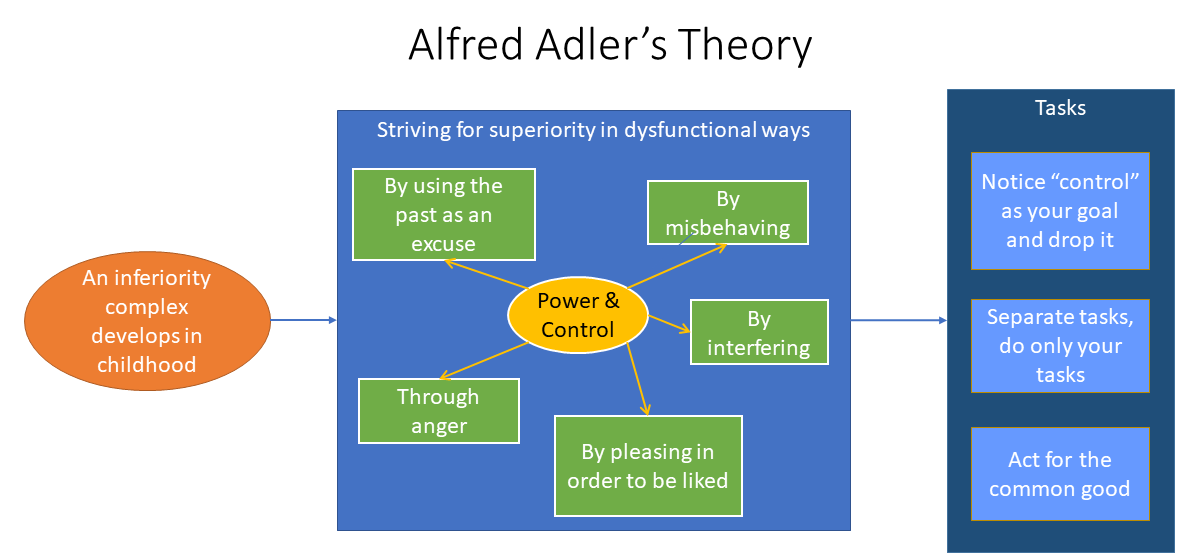The Invited Philosopher
Tamara
This was the 16th dinner, a vegetarian dinner. We met in person in Miami Beach at Tamara’s house.
Menu
- Appetizer: Kale and cabbage salad with pumpkin seed crunch and creamy dill dressing.
- Main course: Gnocchi with a gorgonzola sauce.
- Wine: French rose wine “Gérard Bertrand – Coté des roses – 2021”.
The Philosophy
The Japanese book “The Courage to Be Disliked” published in 2018 and best enjoyed as an audiobook due to the dialogue-format of the book, has given psychologist Alfred Adler’s theories new wings. I would argue that the book’s title should be “The Courage to be Free”. Adler was a contemporary of Freud and Freud initially saw him as a disciple but they later parted ways when Adler disagreed with Freud’s theories. Adler stated that people are not driven by past causes, but driven by goals that they themselves set. Adler believed human behavior is purposeful and goal-oriented, whereas Freud believed it was motivated by unconscious forces linked to the past and by sexual and aggressive urges. Adler did not negate the influence of past experiences, but he focused on one influence from one’s childhood: an inferiority complex. He believed that feelings of inferiority in childhood are what drive people to attempt to gain superiority as adults or to avoid feeling inferior, and that this striving is the force behind people’s thoughts, emotions, and (mis)behaviors that lead to emotional pain.
The Summary
Adler postulates that human beings, as social beings, have a natural desire to contribute usefully for the good of humanity, but the desire for social significance is often thwarted during childhood and over time the main motivation for human behavior becomes a striving for superiority by attempting to control others, take revenge on others, or withdraw from others. There are many threads to follow when using “inferiority complex” as the starting point and while the book follows many, with the main one being “the need to be liked”, we focused on another fascinating aspect during our dinner. We discussed the one aspect that makes Adler’s philosophy revolutionary: his concept of “Separation of tasks”. People should distinguish between their tasks or obligations and that of others and not interfere in other people’s tasks or obligations. He recommended to focus on one important task: to act in the best interest of the community or for the common good. The way “separation of tasks” links to the past is depicted in the graph below.

Analysis
What is my Task? Example of a Teacher’s Task in Parenting
The separation of tasks is best explained in this excellent blog post, and at its core it is a directive to not live one’s life focused on expectations of what other people should do, which also implies, accepting that other people don’t live to satisfy our expectations.
There are many situations when this is very difficult to do. For example, Adler recommends to parents not to interfere in a child’s task of doing their homework, which at first sounds preposterous. But Adler is very nuanced in his recommendations, and what he calls interfering or punishing, and he is against punishing, is for example, screaming or not allowing the child to have dinner until it does homework. The task of the parent is not to punish or force, but to “encourage” the child to do their task, to explain the natural consequences (bad grades, kicked out of school) and also defining logical consequences selected by the parents (fewer distractions, no video games, no phone). While logical consequences sound like punishment, they are not, because they are applied after a discussion with the kid and the kid understanding the consequences, which need to be followed through. The task of doing the homework is still the child’s task, and the consequences belong to him.
There are situations, however, where the lines get blurred. Tamara is a teacher and we used her experience with a student to clarify for ourselves how to separate our tasks, in her case, how to separate her task as a teacher, from the task of the student, and the task of the mother of the student. She told me of a troubled boy, one of her students, around 10 years old, who has no friends, ignores schoolwork, and also sometimes responds to her in a rude manner. Recently, during an important state assessment test, the boy fell asleep on top of his computer and did not do the test. He failed it. She took a picture of the sleeping kid and sent it to his mother. The mother replied: “Oh, he was playing video games all night, that’s probably why he fell asleep”. Tamara recommended to the mother that she turn off the Wi-Fi at night. Tamara said that on one occasion the boy asked her to take him home with her. Perhaps the boy knew he needed a parent who sets boundaries and teaches him discipline. I felt immense pain and compassion for that boy and wished his mother would realize she is not doing her task. Tamara said that this is a pattern in America with immigrant parents who are too busy with work, often divorced as the mother of that boy, and trying to achieve the American dream by focusing on making money, perhaps gaining their own “feeling of superiority”, but that when they come home, they are so tired, they have no energy to deal with their kids and they let them do whatever they want.
It is a heartbreaking situation. And yet, Adler states, it is not Tamara’s task to parent the child nor to worry. She did her task in notifying the mother and encouraging her to be a better parent. According to Adler, she has to then trust that the mother will do what is right. And it is not Tamara’s task to follow up or be too invested in it unless the situation escalates and the kid becomes disruptive in class. For a teacher, it is a fine line to walk.
In every situation that involves other people and that frustrates us because other people are not doing their task, a task that is for their own benefit, we need to remind ourselves: This is not my task!
How do you separate the tasks?
- Define the task of another person as that which will benefit mainly the other person (e.g. for the student: doing homework, for the parent: setting boundaries). Define your task as an action that contributes to the common good without interfering in other people’s tasks (read below the section on “Purpose”).
- Do not intervene in other people’s tasks. Trust that they will do their tasks or that they will bear the consequences and learn.
- Do not let other people intervene in your tasks.
How to Dissolve Anger in You and Others
The following Alfred Adler quotes contain instructions on how to deal with angry people:
“A simple rule in dealing with those who are hard to get along with is to remember that this person is striving to assert his superiority; and you must deal with him from that point of view.”
Or
“We must interpret a bad temper as a sign of inferiority.”
When we equate inferiority feelings with feelings of emotional pain, it allows us to feel compassion for the angry person, which may prevent us from also getting angry. Now while it is easy to see how anger in others is an attempt to feeling superior, Tamara and I discussed, what happens when we shine a light on ourselves and the moments when we get angry? Do we see it in ourselves also, when we get angry, that we are trying to dominate, control and avoid feeling diminished? Tamara has been paying more attention to that during conversations that get heated, and I have been doing the same. In my case, I sometimes know the other person will not back down and it is not my task to make my point or try to be or feel superior which will make the other person feel inferior. My task is to do what is best for all and in a discussion with a loved one or family member, even a colleague at work, I may choose to drop the argument, and for a minute, I may feel inferior or unloved or unappreciated, but I can remember Adler’s advice and tell myself: My task is not to make someone respect me, or love me, or like me. My task is to be loving, caring and respectful towards others.
What is your Purpose in Life?
Usually when people are asked this question, they consider a very specific answer based on who they believe they are and what they want to achieve in life. A very immature person would reply: “My purpose is to be famous! Or rich! Or both!” But Adler states that all humans have the same purpose in life and when we accept that purpose, our problems dissolve.
Two of Adler’s thoughts on the topic are closely related: ”All problems are interpersonal relationship problems” and his most enduring concept: “Gemeinschaftsgefühl”. This German word was inspired by the experience of World War I, and is often translated as “social interest”, but the correct translation is “the feeling of belonging”. Adler argued that we derive much of our life’s meaning from belonging and contributing to a community. This community can be family, friends, and work colleagues and they go along with 3 life tasks we need to fulfill: tasks of love, friendship, and work. We can then easily see how when we have trouble achieving that feeling of belonging, because we are not fulfilling our tasks correctly, we feel frustrated, or disliked, or inferior. Achieving our tasks correctly means we wisely separate them into what is our task and what is the other person’s task. Our task is also our purpose in life: to contribute to the common good.
It is through remembering this, that we free ourselves from the pursuit of superiority. We become free because humility is freedom. As long as we do our task and act for the benefit of the community, we do not need to worry about being liked, listened to, loved or accepted as we are, and conversely, we free ourselves from judging other people as likeable or lovable and learn to accept and love them even when they fail to do their task. Adler reminds us that to accomplish this we just need one thing: Courage!
“Meanings are not determined by situations, but we determine ourselves by the meanings we give to situations.”
― Alfred Adler

